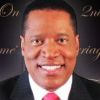19 News Industry Books That Define Modern Journalism
Recommended by Joe Pags Pagliarulo, Sebastian Gorka Drg, Lara Logan — Essential reads to sharpen your understanding of today's news world





What if some of the most trusted news sources aren't telling the full story? In an era where headlines can shape public opinion overnight, understanding the forces behind the news has never been more urgent. The news industry is evolving rapidly, with digital innovation, political pressures, and cultural shifts reshaping how information reaches you.
Seasoned voices like Joe Pags Pagliarulo, a syndicated talk show host known for his media critiques, Sebastian Gorka Drg, a former Department of Defense appointee with a keen eye on political communication, and Lara Logan, an award-winning correspondent, have all turned to insightful books to navigate this complex landscape. Their endorsements highlight the value of these works in unpacking media bias, investigative journalism, and ethical challenges.
While these expert-curated books offer proven frameworks to understand the news industry's intricacies, you might find even greater value in creating a personalized News Industry book tailored to your background and goals. This approach builds on expert insights to fit your specific learning journey.
Recommended by Joe Pags Pagliarulo
Syndicated Talk Show Host
“How bad has journalism become and why? Sharyl Attkisson fills us in. Get her new book "Slanted!" Now! Here's the insightful interview!” (from X)
by Sharyl Attkisson··You?
by Sharyl Attkisson··You?
Drawing from over 40 years in investigative journalism, Sharyl Attkisson examines how major news outlets have shifted from reporting facts to shaping narratives that fit predetermined agendas. You’ll encounter detailed accounts of media manipulation on topics like Black Lives Matter and coronavirus, supported by interviews with insiders from ABC, CBS, CNN, and others. The book unpacks how journalism ethics have eroded and explores the troubling rise of censorship disguised as truth curation. If you’re seeking to understand the changing landscape of news and why skepticism is warranted, this book offers a clear-eyed analysis, though it’s less suited for those looking for balanced media praise.
Recommended by Sebastian Gorka Drg
DoD Presidential Appointee and Podcast Host
“One chapter in and already Alex Marlow’s first book is amazing. It officially comes out Monday, but you should get it now:” (from X)
by Alex Marlow··You?
Alex Marlow, starting as Andrew Breitbart’s first hire at age twenty-one, channels his unique insider experience to dissect the establishment media’s role in shaping political narratives. This book delves into the mechanics behind “fake news,” exposing how major outlets pursued partisan agendas during the Trump era, with detailed chapters on media giants like CNN and The New York Times. You’ll gain a clearer understanding of media ownership, editorial bias, and the cultural battles fought through headlines. If you're intent on grasping how information flows and is manipulated in today’s media landscape, this book offers sharp insights grounded in firsthand knowledge.
by TailoredRead AI·
This tailored book explores the core essentials of the news industry through a personalized lens that matches your background and goals. It covers the foundational principles of journalism, ethical considerations, media dynamics, and the evolving landscape of news delivery. By focusing on your specific interests, it examines topics such as news writing, investigative reporting, digital transformation, and media ethics, creating a learning experience that is both engaging and relevant. This personalized approach reveals how these elements interconnect, helping you build a nuanced understanding of modern journalism. The content is designed to guide you efficiently through complex concepts, making the mastery of news media fundamentals accessible and practical.
Recommended by The New Yorker
“The Axios founders’ new book makes the case for condensed communication—in an increasingly complex world.”
by Jim VandeHei, Mike Allen, Roy Schwartz··You?
by Jim VandeHei, Mike Allen, Roy Schwartz··You?
Drawing from their extensive experience in digital journalism and media innovation, Jim VandeHei, Mike Allen, and Roy Schwartz present a communication approach centered on clarity and conciseness. You learn how to prioritize essential information and deliver it efficiently, mastering the art of saying more with less across formats—from emails to news briefs. The book breaks down their Smart Brevity formula, offering techniques to capture attention quickly, illustrated by examples from Axios's own newsroom practices. If you aim to improve your communication in fast-paced environments, this book empowers you to cut through noise without sacrificing substance.
Recommended by Christina Pushaw
Communications strategist, political commentator
“@scbs146 @SarcasticCupcak they were also big Hitler fans. @AshleyRindsberg has a great book about NYT's love of the Third Reich.” (from X)
by Ashley Rindsberg, Mark Crispin Miller··You?
by Ashley Rindsberg, Mark Crispin Miller··You?
During a deep investigation into media influence, Ashley Rindsberg and Mark Crispin Miller uncover how The New York Times's reporting shaped historical events in ways most readers never suspect. You gain insight into specific episodes like the Times's biased coverage during Nazi Germany's rise and its suppression of the Ukraine famine, revealing how ideology sometimes trumped factual reporting. The book is particularly useful if you're interested in media ethics, history, and the intersection of journalism and power, offering concrete examples such as the critique of the "1619 Project" and ownership influences on editorial choices. This is not light reading, but if you want to understand how a major news institution can alter public perception and history itself, this book serves that purpose well.
Recommended by Brianna Wu
Candidate for US House, software engineer
“4/ @mtaibbi wrote a FANTASTIC book about the @EricHolder justice department, asking why no one significant went to jail after the 2008 financial collapse. It came down to a very conservative approach to prosecution. I believe that’s what happened with Gamergate.” (from X)
by Matt Taibbi··You?
by Matt Taibbi··You?
After analyzing decades of media coverage and political turmoil, Matt Taibbi developed this incisive critique revealing how mainstream news outlets have transformed journalism into a business fueled by outrage and division. Drawing on his extensive experience at Rolling Stone and deep dives into electoral coverage, Taibbi exposes the mechanics behind media narratives that prioritize anger over truth, with chapters detailing media manipulation during pivotal elections and the financial collapse. If you're seeking to understand the forces behind today's polarized news environment and how it shapes public perception, this book offers a revealing, if unsettling, perspective. It’s especially suited for those curious about media ethics, political journalism, and the economics driving news content.
by TailoredRead AI·
This tailored book explores a focused 30-day plan designed to accelerate your grasp of journalism and media dynamics. It delves into core news industry concepts, media influence, ethical reporting, and investigative techniques, carefully matched to your background and goals. By concentrating on daily actionable lessons, it reveals how to build strong news literacy and critical analysis skills efficiently. This personalized approach ensures that the content resonates with your interests and learning pace, providing a clear path through the complexities of modern journalism. Readers engage with a curated synthesis of essential knowledge examining the evolving media landscape and its impact on public discourse.
Recommended by Anne Applebaum
Author of Gulag and Red Famine
“If you don't know what Bellingcat is, this is your chance to learn: We Are Bellingcat tells the story of the most innovative practitioners of open-source intelligence and online journalism in the world. They have told the true stories of the missiles that downed the MH17 airplane in Ukraine and the chemical weapons used by the Syrian dictator Bashar al-Assad. They have identified the neo-Nazis in Charlottesville, exposed a Kremlin hit team, found ISIS supporters in Europe. In this book their founder, Eliot Higgins, describes how and why they do it.”
Drawing from his experience founding Bellingcat, Eliot Higgins reveals how ordinary people can wield open-source tools to investigate global events. You learn detailed investigative techniques used to uncover truths behind complex cases like the MH17 shootdown and chemical attacks in Syria, including how to analyze images and social media data. This book suits anyone interested in modern journalism, digital forensics, or citizen-driven fact-finding. Chapters delve into specific investigations, showing the nuts and bolts of digital sleuthing and revealing the evolving role of online communities in shaping news.
Recommended by The New York Times
“[Susan, Linda, Nina, and Cokie] illuminates the terrifying, thrilling energy of NPR as start-up....The book is a lesson in how the fringe project of one generation becomes the mainstream of the next....Napoli portrays the network’s endearingly experimental, chaotic beginning.”
by Lisa Napoli··You?
Lisa Napoli draws from her extensive journalism career to chart the lives of four pioneering women who reshaped NPR and the news landscape. You gain insight into their unique paths: Cokie Roberts’ political heritage, Susan Stamberg’s trailblazing anchoring, Linda Wertheimer’s rise from humble beginnings, and Nina Totenberg’s innovative Supreme Court coverage. The book explores how these women challenged newsroom sexism and forged a supportive sisterhood that influenced generations. If you're interested in journalism history, gender dynamics in media, or transformative leadership, this narrative offers both vivid storytelling and nuanced understanding of the NPR revolution.
Recommended by Jesse Singal
Author and former New York Magazine writer
“Just recorded a really interesting episode with @bungarsargon about class and journalism and her book” (from X)
by Batya Ungar-Sargon··You?
by Batya Ungar-Sargon··You?
Batya Ungar-Sargon, deputy opinion editor at Newsweek with a PhD from UC Berkeley, takes a critical look at how American journalism shifted from a blue-collar trade to an elite profession disconnected from working-class concerns. You’ll explore how this transformation led newsrooms to embrace radical ideas like critical race theory and intersectionality, often sidelining the broader public’s interests. The book details the rise of woke media and its alignment with corporate incentives amid the digital age’s collapse of local news, explaining why this shift threatens democratic discourse. If you’re interested in the intersection of media, class, and politics, this book offers a sharp analysis of the forces reshaping today’s news landscape.
Recommended by Khadija Patel
Journalism professional and writer
“Byline is many things, prescient, erudite, and timely but it is especially an affirmation of the value of journalism when it is done well.”
by Cristi Hegranes, Seth Libby··You?
by Cristi Hegranes, Seth Libby··You?
After analyzing the persistent challenges facing journalism, Cristi Hegranes offers a fresh perspective rooted in local storytelling. Drawing on her experience leading Global Press, she argues that empowering local journalists to cover their own communities brings depth and authenticity missing from much international reporting. The book dives into the pitfalls of traditional news models and highlights how proximity to events and diverse sources improve accuracy and trust. You’ll gain insights into industry culture shifts, security considerations for reporters, and ideas for restoring public confidence. This approach mainly benefits media professionals and journalism advocates seeking to rethink global news practices.
Recommended by George Will
Author of A Nice Little Place on the North Side
“Don’t judge a book by its cover? Perhaps, but judge Lance Morrow’s by its wonderful, somewhat elegiac title. This history-cum-memoir by one of journalism’s most admired practitioners is packed with anecdotes and vignettes that are as illuminating as they are entertaining. It is a brisk reminder of the way the news business, and the nation, were not long ago.”
by Lance Morrow··You?
by Lance Morrow··You?
Lance Morrow’s decades as a TIME magazine essayist deeply inform this reflective exploration of journalism's golden age. You’ll gain insights into how journalism shaped pivotal moments in the 20th century, from the moral complexities behind Walter Duranty’s Stalin-era reporting to the reverberations of John Hersey’s Hiroshima narrative. Morrow weaves personal history and profiles of iconic journalists, offering a nuanced look at an era now eclipsed by digital media. This book suits anyone aiming to understand journalism’s influence on history and its evolving challenges.
Recommended by Jessie Jane Duff
Retired U.S. Marine Corps Gunnery Sergeant, Policy Research Fellow
“@rsamplecom @JamesOKeefeIII Love having it to read if I miss Mass. And James' book is a MUST read. Mind blowing fearless dude.” (from X)
by James O'Keefe··You?
by James O'Keefe··You?
What happens when investigative journalism meets relentless determination? James O'Keefe, founder of Project Veritas, reveals the hidden layers behind American media in this revealing account. You’ll explore how undercover reporting challenges mainstream narratives, exposing political deception and media bias through gripping real-life examples. The book walks you through high-stakes operations that uncover voter fraud and unethical practices, highlighting both the impact and the backlash faced by truth seekers. If you want to understand the forces shaping public perception and the costs of confronting established power, this book offers a candid, unvarnished perspective.
Recommended by Molly Jongfast
Journalism commentator and media observer
“@Sulliview Love this book so much” (from X)
by Margaret Sullivan··You?
by Margaret Sullivan··You?
Margaret Sullivan leverages her extensive journalism background, including her tenure as The New York Times public editor, to illuminate the dire consequences of the decline in local news. You learn how the shuttering of newspapers has eroded democratic accountability, with concrete examples like mismanaged school districts and unchecked politicians. The book walks you through emerging models aiming to revive local journalism, such as nonprofit digital outlets and initiatives inspired by the Peace Corps. This concise analysis equips you with a clear understanding of the challenges facing local media and why it matters for democracy. It's particularly insightful if you want to grasp the intersection of media decline and civic health without nostalgic overtones.
by Gay Flashman··You?
The research was clear: traditional B2B marketing approaches often fall flat in engaging skeptical audiences, especially in complex buying environments. Gay Flashman, leveraging her extensive background as a television journalist for BBC, ITN, and Sky, offers a fresh perspective by applying brand journalism principles to B2B content. You learn how to craft authentic stories that resonate, build trust, and mirror journalistic rigor, with chapters detailing what makes a story compelling and how to tailor content to customer goals. This book suits marketing professionals and communicators aiming to elevate their brand's narrative beyond typical promotional messages.
Recommended by Mohamed A. Elerian
Chief economic adviser and Cambridge president-elect
“Looking forward to reading Lionel Barber’s book. The excerpts in the Financial Times were so interesting.” (from X)
by Lionel Barber··You?
by Lionel Barber··You?
Lionel Barber, who led the Financial Times during pivotal events like the tech boom and Brexit, draws from his firsthand experience to pull back the curtain on journalism’s inner workings during turbulent times. You’ll find detailed accounts of his interactions with political leaders, bankers on the brink, and Silicon Valley figures, all against the backdrop of a transforming media landscape struggling with the rise of misinformation. For anyone intrigued by the intersection of media influence and global events, this diary offers rare insight into decision-making and reportage under pressure. It’s a sharp look at the shifting power dynamics within the news industry, though it suits readers interested in media leadership and political journalism rather than casual news consumers.
Recommended by Mike Parry
Broadcast personality and journalist
“OK FOLKS .. thanks for all your responses to this book in which I have made a small contribution .. the credit for compiling it and getting it into the bookshops goes to Ivan Little and Deric Henderson .. two of the best I ever worked with .. It is an almighty read ..” (from X)
by Deric Henderson, Ivan Little··You?
by Deric Henderson, Ivan Little··You?
Deric Henderson and Ivan Little bring a deep well of journalistic experience to this collection that captures the raw realities of Northern Ireland's Troubles. Featuring over sixty journalists, including prominent voices like Sir Trevor McDonald and Gavin Esler, the book offers firsthand accounts that reveal the personal and political complexities behind the headlines. You gain a nuanced understanding of the conflict's impact on both reporters and the communities they covered, with chapters detailing unforgettable events and ethical dilemmas faced on the ground. This volume suits those interested in conflict journalism, history, and the human side of news reporting, providing insights beyond standard news narratives.
Recommended by Katharine Viner
Editor-in-chief, Guardian News & Media
“Alan Rusbridger: who broke the news? Fascinating extract from former Guardian editor-in-chief @arusbridger's new book” (from X)
by Alan Rusbridger··You?
by Alan Rusbridger··You?
Alan Rusbridger challenges the conventional wisdom that journalism's golden age has passed by offering a firsthand account of its ongoing reinvention. Drawing on his two decades as editor of The Guardian, he explores how digital technology reshaped news gathering, distribution, and influence, from groundbreaking investigations like the Snowden files to the rise of algorithm-driven news feeds. You'll gain insight into the evolving roles of journalists and media outlets in preserving democracy amid misinformation and commercial pressures. This book suits anyone serious about understanding the modern news ecosystem and its stakes, especially journalists, media professionals, and engaged citizens.
by John Bender, Lucinda Davenport, Michael Drager, Fred Fedler··You?
by John Bender, Lucinda Davenport, Michael Drager, Fred Fedler··You?
John Bender and his co-authors bring their academic and professional journalism experience to this detailed guide on newswriting and reporting fundamentals. You learn to sharpen critical thinking, master thorough reporting techniques, and communicate visually with clarity, updated to include digital journalism trends. For example, the book dedicates chapters to sourcing, interviewing, and ethical decision-making, making it invaluable for developing core journalistic skills. If you’re aiming to understand the nuts and bolts of crafting clear, credible news stories in today’s media landscape, this text provides a steady foundation without fluff or jargon.
by Bill Kovach, Tom Rosenstiel··You?
by Bill Kovach, Tom Rosenstiel··You?
Bill Kovach and Tom Rosenstiel bring decades of frontline journalism experience to this revised edition, which dissects the core principles defining what journalism should be amid today's challenges. You’ll explore how journalism’s role in democracy is shaped by trust, accuracy, and transparency, with chapters that update the conversation for the digital era—including navigating misinformation and leveraging new technologies. This book is particularly insightful for journalists, media students, and anyone striving to understand or uphold journalistic integrity in a fractured media landscape. It doesn’t promise quick fixes but offers a grounded framework for evaluating and practicing journalism responsibly.
by The Associated Press··You?
by The Associated Press··You?
Drawing from its long history as a global news cooperative, The Associated Press crafted this stylebook to codify the precise rules that shape modern news writing and editing. You’ll learn exact guidelines on grammar, punctuation, capitalization, and word usage that define the AP’s clarity and professionalism, including when to prefer "more than" over "over." The book’s 55th edition keeps pace with evolving language and journalistic standards, making it a go-to reference whether you’re a student mastering fundamentals or a professional polishing copy. Its comprehensive index and specialty chapters make navigating complex topics straightforward, though it’s best suited for those deeply invested in journalistic craft rather than casual writers.
Get Your Personal News Industry Guide Fast ✨
Stop sifting through countless books. Get focused news industry strategies tailored for you in 10 minutes.
Trusted by 19 news industry experts and counting
Conclusion
These 19 books collectively reveal a news industry grappling with bias, transformation, and the quest for truth. They expose how media shapes narratives, the rise of digital investigative techniques, and the impact of leadership decisions behind the scenes.
If you're confronting misinformation or seeking to sharpen your media literacy, start with Sharyl Attkisson's Slanted and Matt Taibbi's Hate, Inc. For practical skills, combine Writing and Reporting for the Media with Smart Brevity to hone your communication.
Alternatively, you can create a personalized News Industry book to bridge the gap between general principles and your unique context. These books can help you accelerate your learning journey and equip you to engage with the news landscape more critically and confidently.
Frequently Asked Questions
I'm overwhelmed by the choices – which book should I start with?
Start with Slanted by Sharyl Attkisson for a critical look at media bias, or Smart Brevity to improve your concise communication skills. Both provide accessible entry points into understanding today's news industry.
Are these books suitable for someone new to the news industry?
Yes, several books like Writing and Reporting for the Media and The Elements of Journalism are foundational, designed to build core skills and ethical understanding for beginners.
Should I read the newest books first or classic titles?
Balancing both is best. Newer books like Bad News offer fresh perspectives on current trends, while classics such as The Noise of Typewriters provide historical context essential for deeper comprehension.
Do these books focus more on theory or practical application?
The collection spans both. For example, Byline emphasizes practical local journalism challenges, while The Gray Lady Winked offers theoretical critique of media ethics and history.
How do I know if a book is worth my time?
Look for endorsements from credible experts like Joe Pags Pagliarulo and Sebastian Gorka Drg, and check if the book addresses your specific interests, whether investigative reporting, media bias, or journalism skills.
Can personalized books complement these expert recommendations?
Absolutely. While these books offer expert insights, personalized books tailor content to your experience and goals, bridging general knowledge with your unique needs. Explore personalized News Industry books for targeted learning.
📚 Love this book list?
Help fellow book lovers discover great books, share this curated list with others!
Related Articles You May Like
Explore more curated book recommendations


















